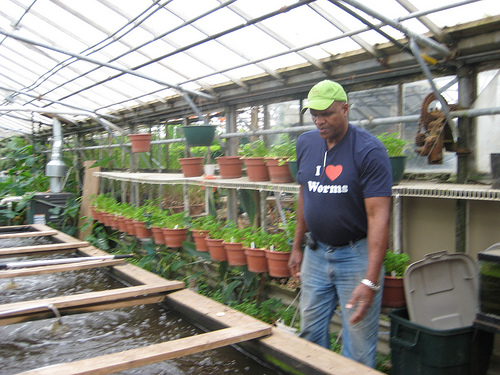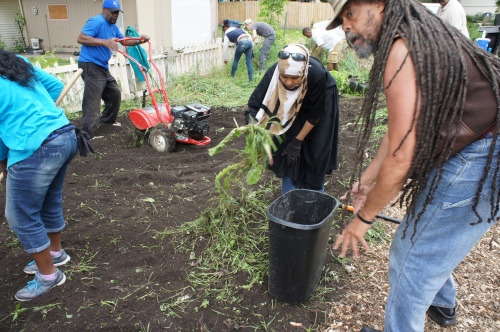Junk food can end obesity insists David Freedman in the current edition of The Atlantic. He also maintains that poor people are more obese and that they can’t/won’t eat fruits, vegetables and other wholesome foods. Thus: better junk food is the healthy solution for poor people.
Really? I have a few choice words for Mr. Freedman, but better than my words — let’s take a look at people who are working to provide a different answer, in poor neighborhoods and inner cities.
LaDonna Redmond started working for food justice as a mother on the West Side of Chicago, living in what some people call “food deserts” without much access to organic or non-processed food — the kind of neighborhood that Freedman believes is unwilling/incapable of choosing vegetables over McDonalds. Freedman insists that this kind of neighborhood will benefit from “healthier junk food,” as exemplified by McDonald’s egg-white breakfast sandwich, with 50 fewer calories than the Egg McMuffin.
Redmond’s vision is a whole lot bigger. “My husband and I started urban farming in our backyard and it grew from getting vacant lots to developing urban farm sites and selling food at farmers markets,” she told Minnesota Women’s Press in an interview this year. “That was the beginning of my work of rebuilding local food systems, first around my neighborhood and now around the country.”
Redmond advocates for what she calls food justice:
“It’s about knowing where your food comes from, knowing who grew the food, under what conditions and to what degree those products are healthy for the land.
“Is it healthy for your body and healthy for the planet? Is it healthy for the people who are enslaved by the food system, people who are forced to work for pennies so that we can have tomatoes, when they cannot afford to buy those same tomatoes? Knowing just a little more about food might slow some people down when they are eating highly processed foods.”
Freedman scoffs at the idea that what he calls “the obese masses” can move away from junk food. He believes that only “a small, elite minority” can be interested in healthy food, and that
“… there is no reasonable scenario under which these foods could become cheap and plentiful enough to serve as the core diet for most of the obese population—even in the unlikely case that your typical junk-food eater would be willing and able to break lifelong habits to embrace kale and yellow beets.”
Instead of kale and beans, Freedman says we should move toward “high-tech anti-obesity food engineering” that would feed poor people better junk food — like a Burger King turkey burger that’s 100 calories better than a Whopper.
Photo of Will Allen by grifray, Creative Commons license
Like LaDonna Redmond, Will Allen has a diametrically different vision of food for poor people. His organization, Growing Power, has worked for 20 years to develop urban farming in Milwaukee and Madison and Chicago, as well as distributing food grown through a network of 300 small family farms. On his website, Allen says, “If people can grow safe, healthy, affordable food, if they have access to land and clean water, this is transformative on every level in a community. I believe we cannot have healthy communities without a healthy food system.”
Right here in Minneapolis, Project Sweetie Pie helps inner-city kids grow their own food. During the 2013 summer, “These young people will be going around to about 30 different gardens to be sure that they are weeded, watered and vibrant. Along the way, they will be learning how to design, plant, and maintain gardens, sell produce, figure out the cost of gardening, and learning about techniques.”
Project Sweetie Pie in action (Photo from website)
In her TedX talk (video above), LaDonna Redmond talks about the intersection of civil rights and food justice. Will Allen and Project Sweetie Pie and a whole long list of activists back to the Black Panther Party breakfast program get it. Maybe The Atlantic should ask them about ending obesity and food justice.



Fantastic! Food justice! The word must get out! Great job!
LikeLike
“The truth shall set you free”. The food justice movement highlights so many silos of justice; economic, civil, social, racial, health, youth and poverty. These issues when intersected into our current food system clarify the truth; ugly and startling when taken into full measure, yet also provide hope, inspiration and healing when confronted squarely. It’s so obvious what we need to do. Established leaders are showing the way. Yet if popular culture doesn’t address the established profit motive factor of a few and infect virally the total story into the masses, the truth will remain clouded. The benefits of transforming our food system are a win-win for everyone. It means survival for this planet. Each one of us has a part. What’s yours?
LikeLike
You are what you eat. You also are what you think. David Freedman’s perspective is absurd, grossly cynical, and discounts the potential of all people, including himself. Transformation of physical, mental and community health is within reach of us all, one wonderful step at a time. Go LaDonna Redmond, go Will Allen, go Project Sweetie Pie!
LikeLike